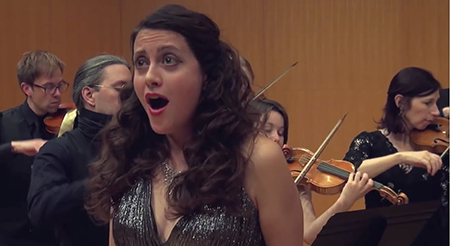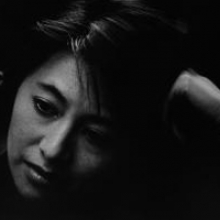by Jarrett Hoffman
TODAY ON THE WEB:
At 7:00 pm via livestream from the Bop Stop, the Cleveland Chamber Collective presents “Music of America.” Built around the diverse styles and influences in the musical landscape of the USA, the program includes music for strings and piano by Reena Esmail, Andrea Clearfield, Yaz Lancaster, Ty Alan Emerson, and Saad Haddad.
More music for strings and piano arrives at that same hour, when CIM shares a virtual faculty recital of music by Mozart, Beethoven, and Brahms.
And at 7:30, in person, Apollo’s Fire gives the first performance of “Virtuosity: Fireworks from J.S. Bach” at First Baptist Church in Shaker Heights — though according to their website, tickets are sold out not only for tonight, but for the whole run of concerts through April 25. If you missed out, there is a waitlist. (Pictured above: soloist Amanda Forsythe, soprano.)
Details in our Concert Listings.
NEW PODCASTS:
In the podcasting category, the Akron Symphony’s Deep River: The Legacy of the Spirituals continues with a listening session featuring works by Morton Gould, William Grant Still, William Dawson, and Margaret Bonds. Listen to episode three here.
And the latest episode of Les Délices’ LD Music Meditations, this one titled “A Meditation on Change and Malleability,” features Diane Kendig’s poem Writ in Water, read by Leon Bibb, with music by Henry Purcell. Listen here.
TODAY’S ALMANAC:
One of the great 20th-century viola players, Emanuel Vardi, was born in Jerusalem on this date in 1915, as was American composer Randall Thompson (1899, New York City). But we’ll focus our attention today on a living composer who also shares that birthday: Hong Kong-born, Canadian composer Melissa Hui, a member of the faculty at McGill University and the recipient of a 1997 Guggenheim Fellowship, who turns 55.
One of the most intriguing projects of her career is the hour-long Pimooteewin (The Journey), which has been billed as the first opera written and sung in Cree (though Hui thinks of it more as an oratorio). It was commissioned by Soundstreams Canada and premiered in 2008.
Sadly, no recording seems to be available. (In one strange way, the transition to virtual for arts organizations during the pandemic has spoiled us — we expect to be able to find anything online now.) But perhaps it’s worth digging into the work descriptively to give you an idea of it, and perhaps to spark a new production in the future.
The story tells of Weesageechak (the Trickster) and Migisoo (the Eagle), who travel to the land of the dead and try to bring back the spirits of their loved ones, only for the dead souls to escape and return to their fellow spirits.
In addition to mining Cree storytelling traditions to write the text, librettist Tomson Highway drew upon a dream he had about his brother, who had died of AIDS-related causes in the ‘90s. In the dream, they were together in a boat on the way to an island shrouded in mist. “On that island, only one of us was allowed to get off and it was him,” Highway has said. “I had no choice but to go back to the mainland in that boat by myself…” (Source: Robin Elliott’s essay “Creating Pimooteewin” from the book Opera Indigene: Re/presenting First Nations and Indigenous Cultures.)
In that same essay, Elliott goes on to explore the music, describing Hui’s “haunting, somber score for the work which evokes the land of the dead” and the sparse scoring — “the warm sounds of the violin and viola are absent from much of the work.” Speaking of scoring, in addition to the tenor and soprano soloists, choir, flutes, oboe, and strings, the percussion section includes both non-Aboriginal and Aboriginal instruments.
As for the challenge of bringing together music and text, Hui notes that she “needed to listen intently to the rhythm of the Cree language” in order to “emphasize the right syllables in each word” and complement “the rhythm of the text.”
Finally, one visual element for us to imagine: the use of kuroko from kabuki theater, as well as puppetry, all choreographed by Michael Greyeyes, with the goal of making the story more understandable to those who don’t speak Cree.
I’ve come across two reviews of performances of Pimooteewin, both in productions put on by Soundstream Canada. In 2008 for Classical FM, Paula Citron praised Hui’s “absolutely stunning” score but was less enthused about the libretto and the production in general. On the other hand, in 2019, when the work was featured in a double-bill of Indigenous-language operas, John Terauds wrote for the Toronto Star that Pimooteewin “is one of those deftly created works that suspends time as it tells its story, and the excellent performances incite us to hope that we won’t have to leave this alternate universe for a while.”
Here’s hoping that some company out there allows us to enter into that universe sometime soon, either live or online.





